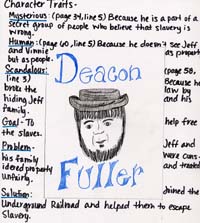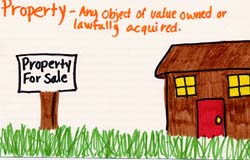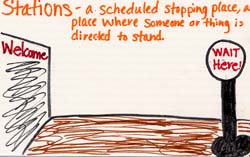
Word Wizard
Discussion Director
Your job is to develop questions group members will discuss about this
portion of the book; decide important ideas and issues raised in this section
of the book and design questions that address them.
Examples: Setting, Problem-Solving, Narrator, Topic, Main Idea,
Cause-Effect, Mood, Character Relationship, and Compare/Contrast
You will want to begin questions with words like:
Who, What, Where, When, Why, How, Tell, Describe
Character -MCEOG:
1. What secret society is Deacon Fuller a member
of?
A.
The Fugitive Slaves
B.
The Underground Railroad
C.
Church Board Association
D.
The U.S. Marshals
(Page
34B. The Underground Railroad)
Setting:
2. What state and year does this story take place?
(Page 37 South Carolina, 1851)
Setting:
3. Once they have reached the end of the path by
wagon, how did Jeff and his family make it to
the next station?
(Page 51 They will row across
the river in a boat.)
Problem/Solution:
4. While waiting for his farther to find the boat,
the US Marshal spotted Tommy and the wagon,
what does Tommy do to keep the
US Marshal from searching the wagon?
(Page 46 He tells the marshal
that he was the one running away on account of him
fearing a licking from his
father because of all the commotion he had made in church.)
Cause/Effect:
5. What would happen if the families were caught
transporting slaves?
(Page 37 The person who returned
them would be rewarded $250 and (Page 45) they
would have to be slaves
once again and never be free.)
Passage Picker
Your job is to select significant passages from the sections being
read; determine why it is important; call other readers’ attention to the
passage and lead discussion on it.
Steps:
1. Pick
out a passage you would like to share.
2. Write
down the page and paragraph number.
3. Write
down the first two words and the last two words of our passage.
4. Write
down the reason you chose the passage, and explain why.
5. Ask
a question about your passage, and give an answer.
6. Write
down the Author’s Purpose: To Describe, To Entertain, To Inform,
or To Persuade
1. Passage One – Historical
2. Page 39, line 1-2
3. “Whoa hosses,…the line.”
4. I chose this passage because it refers to a station
that used to help slaves escape to freedom.
5. Q: What is hidden along the riverbank?
A: The boat that will take
them to freedom.
6. Author’s Purpose: To Inform
1. Passage Two – Dialect
2. Page 47, line 3
3. “He was going to give me a licking.”
4. I chose this passage because it is an example
of dialect that was used during this time period.
5. Q: Why did Tommy find it necessary to make
up the story about running way?
A: He was trying to distract the
Marshal, so that he would not search the wagon.
6. Author’s Purpose: To Describe
1. Passage Three – Historical
2. Page 60
3. “But right…worth $2,500.”
4. I chose this passage because it refers to how
slaves were not thought of as human beings, but
as property.
5. Q: What are Jeff and Vinnie to Master, Maynard
Reeves Bond?
A: Property, just like a
horse or a cow.
6. Author’s Purpose: To Describe
1. Passage Four – Historical
2. Page 42
3. “There’s a…was dry.”
4. I chose this passage because although this book
is historical fiction it talks about how rewards
were given for people who turned
slaves in, which really occurred.
5. Q: Why was Tommy’s mouth dry?
A: He was scared that the
Marshal and his men were going to search his wagon and find Jeff
and his family.
6. Author’s Purpose: To Describe
Character Sketcher
Your job is to develop a character map of major characters in the text.
You will find three words that describe the character. For each word,
or character trait, you will give the proof, or example. The next
thing you will do is to tell one of your character’s goals, or what the
character wants to do in that chapter(s). Then you will find on of
the character’s problems in that chapter(s) and the solution or possible
solution to the problem. Finally, you get to have fun and illustrate
your character.
Deacon Fuller
Character Traits:
Mysterious: page 34, line 5 Because
he is a part of a secret group of people who believe that
slavery is wrong.
Human: Page 60, line 5 Because
he doesn’t see Jeff and Vinnie as property, but as people.
Scandalous: Page 58, line 3 Because
he broke the law by hiding Jeff and his family.
Goal: To help free the slaves.
Problem: Jeff and his family were considered property and treated unfairly.
Solution: Joined the Underground Railroad and helped them
to escape slavery.

Word Wizard
1. Conductors (page 36, line 1)
2. “And they got conductors, said Jeff.”
3. Conductors – One who is in charge of a railroad
or streetcar.
4. Conductors – One who is in charge on a train.
5. Noun
6. The conductor yelled, “All aboard”.
1. Concealing (Page 37, line 13)
2. “All Masters of Vessels and others are hereby
cautioned against concealing or carrying off said
Servants, on Penalty of the Law.”
3. Concealing – To keep from knowledge, exposure.
4. Concealing – Hiding something.
5. Verb
6. The boy got into trouble for concealing a weapon.
1. Property (Page 60, line 2)
2. “But right now the law says Jeff and Vinnie are
another man’s property –”
3. Property – Any object of value owned or lawfully
acquired.
4. Property – Belonging to someone.
5. Noun
6. The piece of land was the Farmer’s property.
7. Word Wizard Card


1. Stations (Page 35, line 5)
2. “And they got stations on the Underground Railroad,
said little Jeff.”
3. Stations – a scheduled stopping place, a place
where someone or thing is directed to stand.
4. Stations – A specific place to stop.
5. Noun
6. The Ohio River was a station on the Underground
Railroad.
7. Word Wizard Card


Investigator
Your job is to dig up background information on the Underground Railroad.
The information you will help your group understand the book better.
Ways to gather information:
1. The introduction, preface, or “about the author” section of
your book
2. Library books and magazines
3. On-line computer search
4. Encyclopedia
5. Interviews with people who know the topic
6. Other novels, nonfiction, or textbooks you’ve read
Specific things to look for are:
1. What are the Fugitive Slave
Laws?
It required “all good citizens”
to help Federal Marshals return captured runaway slaves to their
masters.
2. Define Abolitionist?
People who joined
secret societies that worked to abolish slavery.
3. When did slavery come to an end?
Between 1863 and 1865
– during and just after the Civil War, slavery finally came to an end
everywhere in this
country.